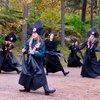“"White crane!
Lend me your wings
I will not fly far
From Lithang, I shall return"”
'Song of the White Crane’ is based on the poetry of the Mahasiddha Abhishekavajra: the Mantradharin Tsangyang Gyamtso (sNgags ‘chang tshang dByangs rGya mTsho / སྔགས་འཆང་ཚང་དབྱངས་རྒྱ་མཚོ་) otherwise known as the Sixth Dalai Lama.
He was born into the family cham of Pema Lingpa—and, unlike the previous Dalai Lamas—never took celibacy vows.
Selected ‘Songs of the 6th Dalai Lama’ were translated by Ngak’chang Rinpoche with Jétsunma Khandro Ten’dzin Drölkar and her daughter Tséring Lhamo in Forsyth Bazaar, Himachal Pradesh, in 1975.
According to the Secret Biography of the 6th Dalai Lama, he attained parinirvana in Alashan in Southern Mongolia. His incarnation was Lobsang Thubten Gyamtso (bLo bZang thub sTan rGya mTsho / བློ་བཟང་ཐུབ་སྟན་རྒྱ་མཚོ་) and from him stemmed a line of Lamas who were known the Kündröl Trülkus (Kun sGrol sPrul sKu / ཀུན་སྒྲོལ་སྤྲུལ་སྐུ་) alternatively known as the Dwagtrül Lamas (དྭག་སྤྲུལ་བཉལ་མ་).
The Russian explorer Pyotr Kozlov met the Kündröl Tulku in 1906 in Barun Hyt, in Alashan. He was reported to be forty years of age at the time and notable for his clarity, perspicacity, and superlative spiritual integrity. The last recorded Kündrül Trülku was Gégin, who died in the 1950/1951.
Here is a Tibetan nomad song by Tenzin Choegyal based on the poem.








